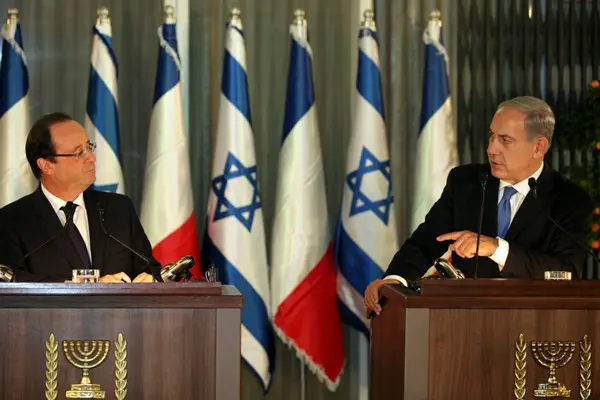French attempts to revive the stalled Israeli-Palestinian peace process have been met with a repeated Israeli refusal.
In a visit in the beginning of Nov. by French envoy Pierre Vimont to Israel and the Palestinian territories, Israel reconfirmed it will not take part in the conference scheduled for the end of 2016.
Vimont was in the region to update the sides on the work being done ahead of the conference, but Israel's absence will most likely guarantee its failure.
A few months ago, foreign ministers from several countries met in Paris for preliminary discussions.
Vimont reportedly told the sides about the working groups established after the initial summer conference and the progress that has been made.
While the Palestinians have expressed their willingness to take part in the conference, Israel has expressed its dismay at the attempt.
In a statement released after the meeting between the French envoy and representatives of Israeli Prime Minister Benjamin Netanyahu, the Israeli side said it maintains its "unequivocal position that true progress...will come only through direct negotiations...and that any other initiative only pushes the region further away from this process."
Avi Pazner, a former senior Israeli diplomat, believes Israel's past experience serves as a relatively reliable prediction for the failure of the conference. The two peace agreements Israel has signed with Egypt and Jordan, once staunch rivals of Israel, were reached through direct negotiations.
Palestinian President Mahmoud Abbas (L) and French President Francois Hollande make a joint statement after a meeting to discuss France's initiative for peace in the Middle East at the Elysee Palace in Paris, April 15, 2016. Photo: REUTERS
He believes the French peace plan "is not suitable for the Middle East."
In recent years, Israel has become increasingly isolated in the international arena.
The continued stalemate in the negotiations coupled with Israel's continued settlement activity has made it difficult for Israel to garner support in the international community.
An international conference would highlight Israel's tough position.
"The moment we (Israel) go to a conference with 20, 30 or 40 participants, Israel will be completely isolated. We will be there in a position of inferiority," said Pazner.
He believes Israel may be forced to make concessions that are seen as unacceptable by many Israelis.
The Israeli opposition is highly critical of Netanyahu's lack of willingness to negotiate with the Palestinians and the subsequent deterioration of the country's international image.
However, the Israeli premier received some support from the opposition.
Yair Lapid, a leading member of the opposition, was quoted as saying "Israel will not be led to negotiations under threats. We will not be dragged into this."
Lapid was referring to France's ultimatum that should the conference fail, France would recognize a Palestinian state anyway.
France later retracted this statement, due to strong Israeli objection, but still Israel did not change its mind on participating.
While Netanyahu could theoretically contemplate attending the conference, Pazner believes the potential for damage is huge.
The French initiative is based on a demand for Israel to halt all settlement activities in the West Bank and Jerusalem.
Shimon Peres, the former Israeli president, and French President Francois Hollande. Photo: AFP
Israeli settlement activity has continued in Netanyahu's term in office.
The cessation of settlement activity has been a pre-condition for the resumption of negotiations by the Palestinians for years.
The French agreement to this is seen by Israelis as one of the reasons the conference is per-disposed against them.
Palestinians see the territories of the West Bank and East Jerusalem as the basis of their future state.
The French initiative does not demand the Palestinians freeze their diplomatic offensive against Israel, as the Palestinians are pushing for several anti-Israeli resolutions in various international bodies.
Animosity between the two sides runs deep and such moves do not contribute to a positive atmosphere.
There is also continuous violence between the two sides. Since Sept. 2015, over 200 Palestinians have been killed by Israeli forces. Tens of Israelis have also been killed by Palestinian attackers.
Tensions are high and peace-making is currently not on the table.
Pazner believes that the internal political climate is pivotal in bringing the sides to the table and is what currently is keeping them away from negotiations.
Netanyahu's hawkish coalition partners are not naturally pre-disposed to making concessions to the Palestinians.
Palestinian President Mahmoud Abbas is under constant threat from the extremist Hamas. Hamas does not recognize Israel's right to exist and has the potential of taking control over the West Bank, should elections be held there.
The transition of power in the United States may make a difference.
US President Barack Obama has been openly critical of Netanyahu's policies towards the Palestinians and this has been a source of great tension between the two leaders.
Should a UN resolution calling for the establishment of a Palestinian state be tabled before U.S. President-elect Donald Trump is sworn in, Obama may choose not to veto it.
In the past, the U.S. has vetoed every anti-Israeli resolution.
Pazner does not think that will happen although he acknowledges the 'probability exists.'
Chances of something major happening in the coming months or at the conference are slim. Any agreement reached with the Palestinians without the Israelis is futile since the Israelis are critical for the implementation.
(APD)
 简体中文
简体中文

